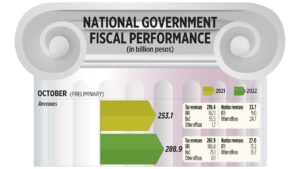Department of miseducation

The bias in some Department of Education (DepEd) teaching materials against Vice-President Leni Robredo was obvious and bad enough. But even worse are their errors — the word “government” was for example misspelled in the offending texts — and their misleading and releasing these among the populace of ill-trained and uninformed future citizens incapable of wisely exercising their rights and discharging their duties, such as electing the right leaders of this rumored democracy.
Whether old (print, broadcasting, film) or new (online news sites, blogs, etc.), as purveyors of information the media can shackle the mind or free it, and deter change or accelerate it. So can the educational system provide the knowledge and understanding that can liberate men and women from ignorance — or keep them in its depths by miseducating them.
For the most part, however, both primarily function as among the means through which the State persuades and convinces the citizenry that things should remain the way they have always been. Some teachers and media practitioners are advocates of change, whether cultural, political, economic, or social. But they are the exceptions rather than the rule — deviations from the “normal” almost immediately provoke State intervention.
The Philippine experience is illustrative of how the power elite has repeatedly tried, and mostly succeeded, in controlling the narratives of the media and the educational system on what happened in the past and what is happening in the present of these troubled isles.
The political economy of the dominant media — their being commercial enterprises in the hands of economic interests whose protection and advancement depends on government goodwill — has led to institutional and practitioner self-censorship, among other consequences. Although privately owned, some media organizations are besieged by such other problems as government threats and harassment, which prevent them from fully discharging the ethical and professional responsibilities of truth-telling.
Control over the educational system is, on the other hand, at least partly assured by its being an instrumentality of the Executive Branch of government through DepEd and the Commission on Higher Education (CHED). But that control has not been absolute.
For example, although a State institution, the University of the Philippines (UP) has a number of times been in the crosshairs of State intervention for some of its constituents’ criticism of government, its officials, and its policies.
It was accused of promoting “godlessness” and “subversion” in the late 1950s. A number of its professors were brought before the House of Representatives Committee on Anti-Filipino Activities (CAFA) and interrogated for publishing a document in one of its research journals on how the tenancy system was driving the peasantry to rebellion. Martial law shut it down for weeks. Its staff, students, and faculty were already under surveillance prior to its declaration, and some were arrested and detained indefinitely once martial rule was implemented. It has more recently been tagged a “recruitment center” of the Communist Party of the Philippines (CPP) and the New People’s Army (NPA), apparently for some of its professors’ encouraging, and some of its students’ internalizing, the imperative of learning as a lifelong commitment of the truly educated man and woman.
But that is only UP — and only some of its professors and students. As for the so-called State “universities” created by congressmen out of this or that fifth-rate school in their districts, few of their so-called professors, if any, are even aware of the responsibilities of teaching and learning, and are easily bullied by such pretenders to academic authority as police and military censors into purging their libraries and silencing themselves and their students.
Their reach, however, is fairly limited compared to that of basic education, which shapes the minds of the young at their most vulnerable and impressionable age. Indeed, it is in the primary and secondary schools under DepEd’s charge where much of the misinformation and disinformation that clutter the brains of millions of Filipinos is generated, shared, and distributed.
The quality of the products of any system is what best describes it, its capacities as well as its flaws. There are basic education graduates who have not even heard of Adolf Hitler, for example, despite that monster’s slaughter of more than six million Jews and other “undesirables” (no wonder his admirer Rodrigo Duterte thought the number to be three million); his having committed the worst crime in all of human history; and his starting a war that killed an additional 50 million people in Europe alone.
Here in the lair of the Philippines’ ruling dynasties, the domestic equivalent of European fascism is hardly studied. If the Marcos kleptocracy is at all mentioned in school, it is in glowing terms by clueless teachers who use the error-filled textbooks written by well-connected “authors” that they make their students read. That the Marcos dictatorship is being described as a “golden age” — the exact opposite of what it really was — could only have originated in this country’s primary and secondary level classrooms.
It explains why the 30- to 40-year-olds who constitute the bulk of the supporters of Ferdinand Marcos, Jr. and his family either have no inkling of what transpired during that dark and brutal period, or else romanticize it as a time of peace, justice, and prosperity — and who spread their sub-literate views through Instagram and Tiktok.
Among the consequences of mass ignorance of those dark periods in history is the failure to appreciate the value of human rights and to understand how barbaric dictatorships can be. To many Filipinos, despotism is either an abstraction that has nothing to do with human lives — or, worse, a benevolent and even necessary option in times of crisis.
As bad or even worse is the failure of the same system to even provide the literacy and numeracy skills individuals need. Every independent study on the capacities of Filipino primary and secondary students has in fact found abysmally low levels of reading and mathematical competence among them.
Those findings seriously question their capacity to meet the complex challenges posed by the problems of their own country or even to survive them. Many thus end up either as domestics at home or abroad, or as part of the vast legions of the unemployed and unemployable, while being among the most confident people in the world about their social media-based, fact-challenged opinions on public issues.
The historian Renato Constantino wrote lengthily in his pioneering work, The Miseducation of the Filipino, on how little Filipinos know about what happened in Philippine history, and how misleading a guide in navigating the turbulent waters of the Philippine crisis their limited knowledge of it has been. And yet, as he pointed out, education is crucial to the cultural renewal necessary for the realization of their aspirations for a just and reasonably prosperous society.
That was in the 1960s, but here we are, six decades later and already in the 21st century, with those hopes still unrealized. Certainly, one of the reasons for it is the failure of the so-called educational system to provide the knowledge that is among the most crucial factors in any society’s advancement and even survival.
That failure is a convincing argument in favor of giving the agency in charge of education in this part of the planet a name that more accurately describes what it has been doing. But that of course will never happen — not in this country where the words of government are too often part of the State apparatus of mass deception rather than of enlightenment.
Luis V. Teodoro is on Facebook and Twitter (@luisteodoro).




